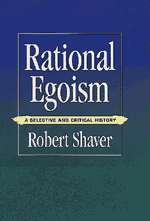3 - Sidgwick
Published online by Cambridge University Press: 05 November 2011
Summary
Sidgwick is the most astute defender and the most astute critic of rational egoism. His astuteness is evidenced in numerous ways.
First, Sidgwick takes rational egoism seriously. He is not much concerned with whether it qualifies as a moral theory. Perhaps it does not – but since there is “wide acceptance” of it, it deserves consideration as a theory of reasons for action. (ME 119) Sidgwick asks the general question “What do I have most reason to do?”
Second, in answering this question, Sidgwick holds that virtue does not always pay. He refuses to settle for the comfortable and popular reconciliation of morality and rational egoism. (ME 162–75, 502–9)
Third, Sidgwick is aware, as no one before or since, of the history of rational egoism. His Outlines of the History of Ethics contains the best, and indeed almost the only, history of the position.
Fourth, he rejects the arguments uncovered in this history that purport to establish rational egoism on the basis of psychological egoism. Here I shall, briefly, give his reasons.
Say psychological egoism is true. This does not exclude the possibility that I take my pleasure from doing what I take to be right, while holding that, say, utilitarian considerations make right acts right. (ME 40–1) Belief in psychological egoism, then, does not compel belief in rational egoism.
- Type
- Chapter
- Information
- Rational EgoismA Selective and Critical History, pp. 59 - 109Publisher: Cambridge University PressPrint publication year: 1998



